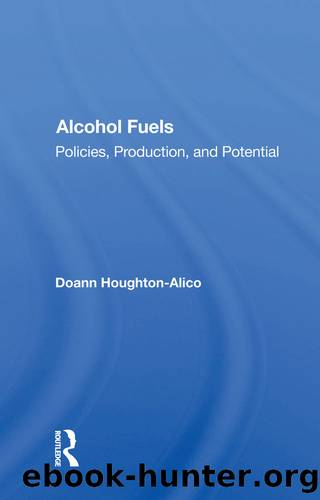Alcohol Fuels: Policies, Production, and Potential by Doann Houghton-alico

Author:Doann Houghton-alico [Houghton-alico, Doann]
Language: eng
Format: epub
Tags: Political Science, General
ISBN: 9780429724657
Google: 102wDwAAQBAJ
Goodreads: 45913951
Publisher: Routledge
Published: 2019-04-18T00:00:00+00:00
Use of Alcohol Fuels in Gas Turbine Engines
Gas turbine engines can be used without modifications for alcohol fuels; however, modifications would probably increase performance. Possible modifications include (1) explosion-proofing the engine, (2) doubling the fuel flow rates, and (3) adding lubrication. Corrosion and deposits from sulphur, other metals, and sodium are particularly detrimental to gas turbine engines. Because ethanol and methanol are so easily miscible in water, which could contain sodium salts or other impurities, it is particularly important to keep them free of impure water. If these precautions are taken, the turbines should last three to four times longer between overhauls (Hagen 1977).
The U.S. Department of Energy (DOE) predicts that alcohol fuels could supply all projected utility peaking gas turbine requirements as early as 1987, almost three times the projected requirements by 1990, and about four times the projected requirements by 2000 (U.S. Department of Energy 1979).
United Technologies, Inc. tested an 18-megawatt gas turbine for Florida Power Corp.'s Bayboro plant. Seventy-four percent fewer NOX emissions were reported. However, CO emissions increased 30 ppm above No. 2 distillate oil. United Technologies concluded that methanol was an ideal fuel if cost and supply problems could be solved (Hung 1977).
General Electric Co. has tested methanol in a combustion chamber for potential use as a gas turbine engine fuel. These tests show a 6% gain in power output with neat methanol and a 12% gain with 20% water and 80% methanol above No. 2 distillate oil. NOx emissions were reduced 40% (Hagan 1977).
The Garrett Corp. has developed a 548 kilowatt-735 hp continuous (800 hp stand-by) gas turbine engine that runs on a 90% ethanol-10% water fuel. The engines are single-shaft, constant-speed, self-governing turbine engines and are in use in Brazil. The ethanol is produced from cassava (manioc) feedstocks. The NOx emissions are 25% less than in a comparable 800 hp diesel engine, and the CO emissions are 50% lower (Fallon 1981).
Download
This site does not store any files on its server. We only index and link to content provided by other sites. Please contact the content providers to delete copyright contents if any and email us, we'll remove relevant links or contents immediately.
Life 3.0: Being Human in the Age of Artificial Intelligence by Tegmark Max(5547)
The Sports Rules Book by Human Kinetics(4379)
The Age of Surveillance Capitalism by Shoshana Zuboff(4275)
ACT Math For Dummies by Zegarelli Mark(4043)
Unlabel: Selling You Without Selling Out by Marc Ecko(3658)
Blood, Sweat, and Pixels by Jason Schreier(3614)
Hidden Persuasion: 33 psychological influence techniques in advertising by Marc Andrews & Matthijs van Leeuwen & Rick van Baaren(3552)
The Pixar Touch by David A. Price(3431)
Bad Pharma by Ben Goldacre(3422)
Urban Outlaw by Magnus Walker(3392)
Project Animal Farm: An Accidental Journey into the Secret World of Farming and the Truth About Our Food by Sonia Faruqi(3212)
Kitchen confidential by Anthony Bourdain(3080)
Brotopia by Emily Chang(3049)
Slugfest by Reed Tucker(2997)
The Content Trap by Bharat Anand(2917)
The Airbnb Story by Leigh Gallagher(2851)
Coffee for One by KJ Fallon(2630)
Smuggler's Cove: Exotic Cocktails, Rum, and the Cult of Tiki by Martin Cate & Rebecca Cate(2519)
Beer is proof God loves us by Charles W. Bamforth(2453)
